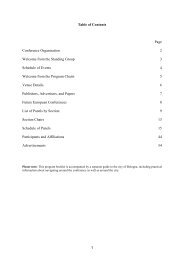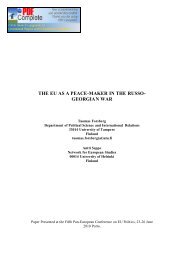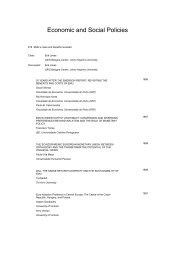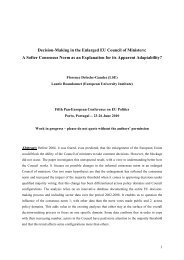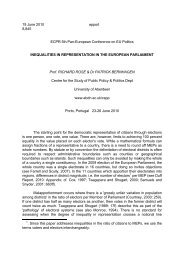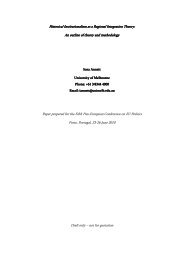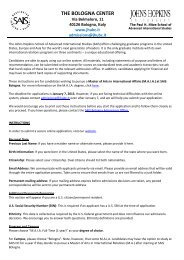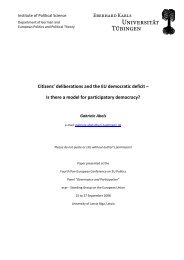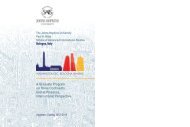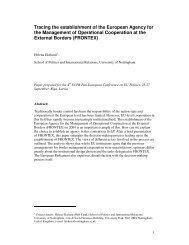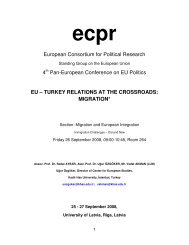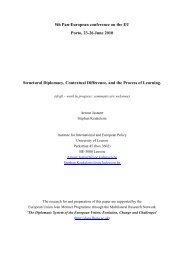Create successful ePaper yourself
Turn your PDF publications into a flip-book with our unique Google optimized e-Paper software.
The Academic Year 2011–2012<br />
THE ACADEMIC YEAR 2011–2012<br />
jhubc.it/academics<br />
General Information<br />
Approximately one-half of all SAIS M.A.<br />
candidates spend their first year at the <strong>Bologna</strong><br />
<strong>Center</strong>. Courses at the <strong>Center</strong> are taught in<br />
English and, whenever possible, classes are<br />
conducted as small seminars.<br />
M.A. candidates concentrate in two programs,<br />
one of which must be in International Economics.<br />
The second program is chosen by the student<br />
either during the application process (see<br />
International Development) or at the beginning<br />
of their studies. Most M.A. concentrations<br />
require completion of approximately six courses<br />
in the program, leaving space for elective courses<br />
over the two years of study. Faculty advisers are<br />
available to assist students with their choice of<br />
program and courses during orientation and<br />
throughout their studies.<br />
Courses at the <strong>Bologna</strong> <strong>Center</strong> are classified<br />
as follows: Core Courses, International Economics,<br />
International Relations, International Development,<br />
American Foreign Policy, European Studies,<br />
Middle East Studies and Western Hemisphere<br />
Studies/Latin American Studies.<br />
Available Concentrations<br />
at the <strong>Bologna</strong> <strong>Center</strong><br />
With the exception of Asian Studies, all<br />
concentrations are available in <strong>Bologna</strong>. Most<br />
SAIS students concentrating in European Studies,<br />
American Foreign Policy, and International<br />
Relations begin their studies in <strong>Bologna</strong>.<br />
Candidates for the M.A. should select their<br />
second program of concentration and choose<br />
their courses only after carefully reviewing the<br />
requirements and consulting with faculty advisers<br />
in <strong>Bologna</strong>.<br />
Core Requirements<br />
Core requirements for the M.A. degree at the<br />
<strong>Bologna</strong> <strong>Center</strong> are divided in four areas:<br />
Evolution of the International System, Theories<br />
of International Relations, America and the<br />
World Since 1945, and Comparative National<br />
Systems. M.A. candidates must pass written<br />
examinations in two of these core areas (except<br />
students in European Studies, who take three<br />
comprehensive European Studies exams).<br />
Students are urged to pass one of these exams by<br />
the end of their first year and to pass both before<br />
beginning the second year. Students with an<br />
adequate background are encouraged to take the<br />
core examinations upon entry. During the year,<br />
students may prepare for a core examination by<br />
studying on their own, auditing or enrolling for<br />
credit in a core course.<br />
Core exams are graded with a letter grade.<br />
Only passing grades appear on the transcript.<br />
Students who fail a core exam twice are required to<br />
register for the corresponding core course for<br />
credit. After enrolling for credit, a student’s result<br />
of any prior examination is eliminated from the<br />
transcript, and grading requirements for regular<br />
courses apply. Core exams are offered three times a<br />
year at the <strong>Bologna</strong> <strong>Center</strong>: first week of October<br />
and at the end of each semester.<br />
19





